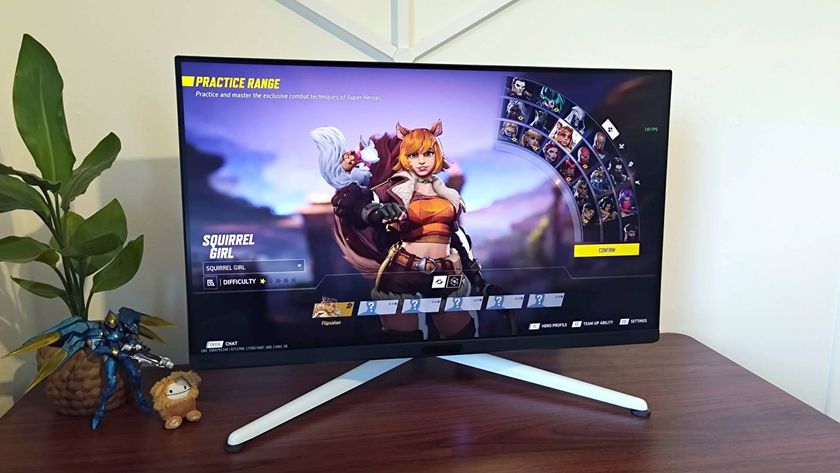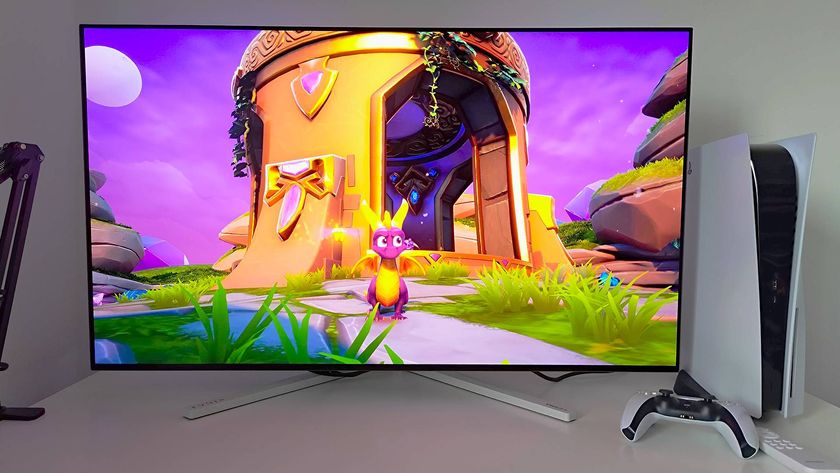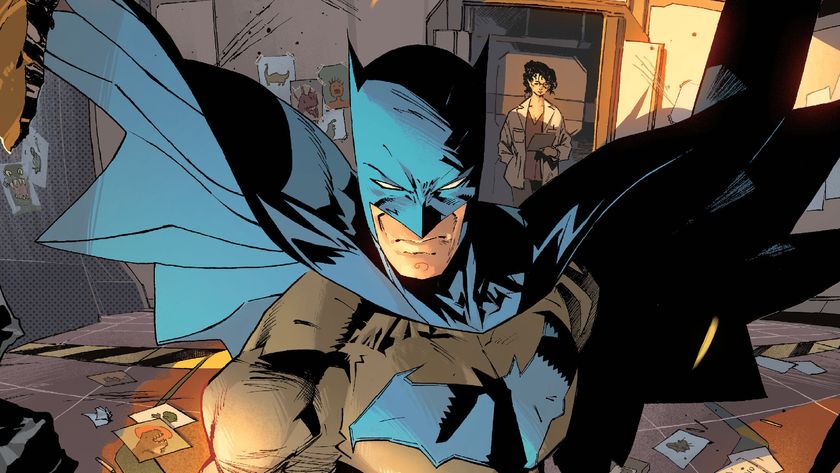I tried Samsung’s new OLED gaming monitors early, and one feature should have rivals worried
Hands-on with the new Samsung Odyssey OLED G6 and G8
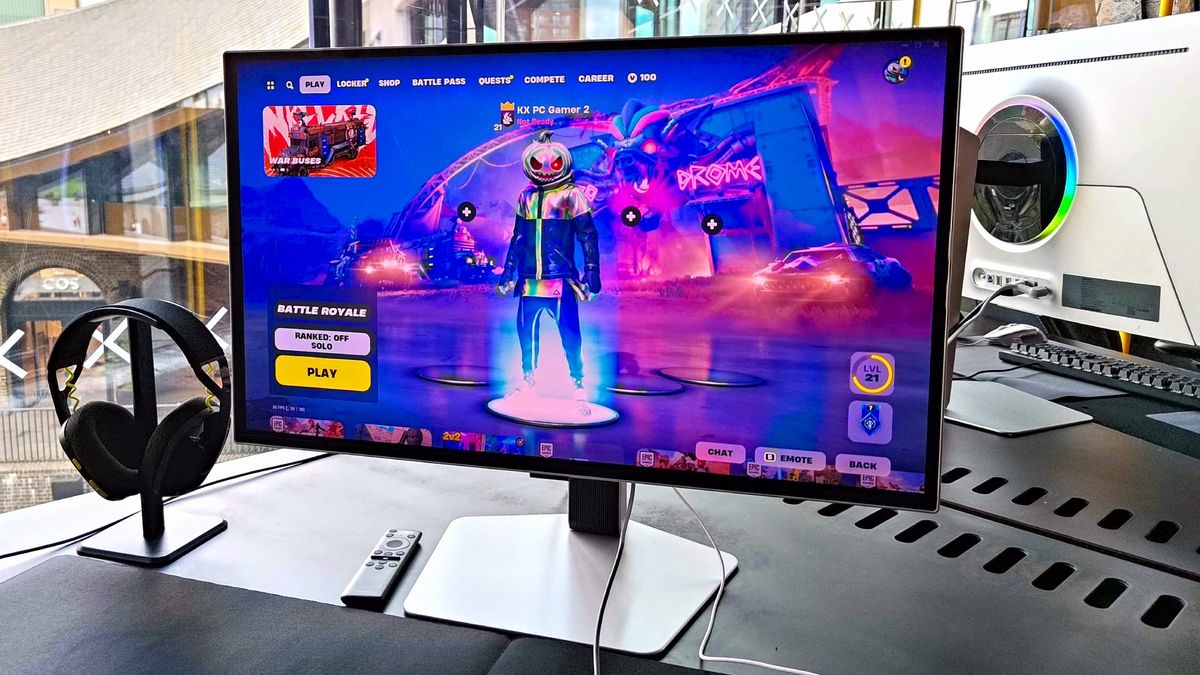
Recent updates
August 2, 2024 - Our Samsung Odyssey OLED G6 review is now live, and we're pleased to report the monitor lives up to our early impressions below. For comprehensive analysis of the 1440p 360Hz screens capabilities, as well as hands-on feedback based on hours of testing, make sure to check out our full rundown.
New Samsung OLED gaming monitors are on the way, and the Odyssey G6 and Odyssey G8 already feel like something special. At this stage, screens really have to go out of their way to leave an impression on me, but this new duo has caught my attention through style, impressive specs, and one feature that facilitates punchy visuals at every angle. In fact, I’m worried that many other displays in 2024 are going to fall short if they can’t replicate one particular trait.
It takes more than just an impressive OLED panel to make my best gaming monitor list, as the whole package matters. Sure, previous models like the Samsung Odyssey OLED G9 hold their position thanks to incredible contrast and colors, but it's the screen maker’s attention to design that ultimately earns it the crown. While I’ll need to properly road-test the new Odyssey OLED G6 and G8 models to know if the same applies, even a short demo has left me thinking about how the displays would look in my office.
Last week, I was invited by Samsung to feast my eyes on the new Odyssey OLED G6 and G8. Admittedly, I wasn’t sure whether the 32-inch 4K UHD model or the 27-inch QHD model would rock my world, as I’ve tested plenty of excellent OLED panels with speedy refresh rates and snappy response times. And, while the displays impress in both those departments with 240Hz and 360Hz abilities, getting a good look at them first-hand hammered home what all the fuss is about.
Eye-catching from all angles
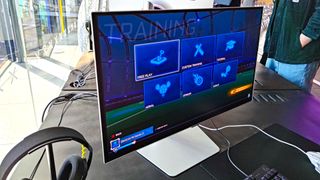
The very first thing I noticed was that the OLED G6 and G8 appeared immune to glare, which is impressive given the “demo bus” was parked right next to a large window. Better still, it happened to be one of the sunniest days we’ve had in weeks, but even that seemingly couldn’t beat Samsung’s new “OLED Glare-Free technology.” My gaming desk at home sits right next to a window, so I’m more than aware of the havoc a nice day can wreak on a gaming session (promoting me to go out for a walk instead of bashing my Steam backlog).
Before planking myself down for a proper test session, I got a 360° look at the OLED G6 and G8, and the experience was refreshing. I’m well aware that Samsung knows how to make pretty displays, and both these new gaming monitors embody the tech giant’s dedication to aesthetics. The design is similar to that of the Odyssey Neo range, but the panel type allows for a much slimmer profile and a tapered back that avoids using a big boxy hump for IO placement.


I’m not saying that having the likes of the Dough Spectrum Black and Corsair Xeneon 27QHD240 with a protruding box is a deal breaker, but both do look clunky compared to the gentle curves of the new Odyssey OLED range. Plus, I’m a big fan of HDMI and DisplayPort facing outwards rather than living under a lip, as it’s far easier to hook up consoles and other PCs on a whim. It also means that functional elements don’t disrupt the RGB ring at the center, helping add a bit of flare to an otherwise minimalist design.
I want to also praise the G6 and G8’s choice of pedestal stand, as it trades V-shapes and chonky bases for a low-profile pentagon. At first, it may look like it takes up more space than it needs to, but since it’s thin, you’ll actually have more freedom to fit accessories and things like soundbars underneath. I reckon it could even serve as a nice console platform – a huge win if you’re looking specifically for a monitor for PS5 or somewhere to pop your Steam Deck dock.
Sign up to the 12DOVE Newsletter
Weekly digests, tales from the communities you love, and more
Snappy and striking
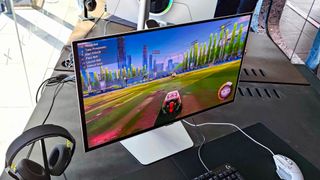
To get a feel for both the G6, I used Samsung’s gaming mouse and keyboard setup to whiz around in Rocket League. At 27 inches, I wasn’t able to sniff out any fidelity issues playing at 1440p, with the display's 360Hz 0.03ms abilities also helping to keep my eyes busy. Everything felt as slick as I’d have expected from an OLED panel in 2024, and the contrast was once again elevated by the complete lack of glare from either the room’s lighting or the glorious weather happening outside.
| Specs | Samsung Odyssey OLED G6 (G60SD) | Samsung Odyssey OLED G8 (G80SD) |
|---|---|---|
| Price | $899.99 / £799 | $1,299.99 / £1,099.99 |
| Screen size | 27-inch | 32-inch |
| Aspect ratio | 16:9 | 16:9 |
| Resolution | 2560 x 1440 | 3840 x 2160 |
| Refresh rate | 360Hz | 240Hz |
| Brightness | 300 nits | 250 nits |
| Viewing angles | 178°/178° | 178°/178° |
| Contrast ratio | 1,000,000:1 | 1,000,000:1 |
| Panel | OLED | OLED |
The larger 32-inch G8 model dials things down to 240Hz to achieve UHD, and it makes for a strong 4K gaming monitor contender. It’d take more than a quick session in Fortnite for me to detect the difference in refresh rate, but at face value, the experience feels just as snappy. The OLED panel also pulls punches to help maintain that balance of speed and vibrance, and once again, zero glare in spite of being positioned right in front of a large window.
Samsung’s burn-in battle
My hands-on impressions aside, there are a couple of OLED G6 and G8 features that should help both panels win players over. For instance, Samsung has armed both with OLED Safeguard+ tech, which uses a “pulsating heart pipe” and “Dynamic Cooling System” to shift more heat than traditional methods. There are also some preventative brightness measures at hand to combat things like static logos and images, so you probably won’t be haunted by your favorite game’s UI after a few years of use.
I’m also thrilled to report that G8 comes with a remote control, and I really hope it helps end fiddly nubs and OSD buttons. Admittedly, the 4K model comes with Tizen smart features baked in, which makes the addition of a remote necessary, but I’m still pretty hyped for the added extra. I’d go as far as to say that it makes it worth picking up over smaller gaming TV options out there, as you’ll have everything to hand that you’d find in a living room display.
Glorious anti-glare makes a difference
I don’t want to act all clairvoyant about my own upcoming Samsung Odyssey OLED G6 review, but I’m certain Glare-Free tech is going to be a big talking point. Same applies to the G8, and it could be enough to make rivals sweat. Combatting reflections and bright patches isn’t anything new, as it’s been a feature of many screens over the past few years. However, now that I’ve clapped my eyes on Samsung’s latest attempt, I’m going to struggle using and reviewing other screens.
Both the new Odyssey OLED G6 and G8 will go on sale 18 June, but UK players can pre-order the G6 right now at Currys. We're still waiting for orders to go live in the US, but watch this space.
Looking for more screens? Check out the best curved gaming monitors and best ultrawide gaming monitors for more models. Alternatively, take a peek at the best portable monitor for gaming if you need an on-the-go panel.

I’ve been messing around with PCs, video game consoles, and tech since before I could speak. Don’t get me wrong, I kickstarted my relationship with technology by jamming a Hot Wheels double-decker bus into my parent’s VCR, but we all have to start somewhere. I even somehow managed to become a walking, talking buyer’s guide at my teenage supermarket job, which helped me accept my career fate. So, rather than try to realise my musician dreams, or see out my University degree, I started running my own retro pop culture site and writing about video games and tech for the likes of TechRadar, The Daily Star, and the BBC before eventually ending up with a job covering graphics card shenanigans at PCGamesN. Now, I’m your friendly neighbourhood Hardware Editor at GamesRadar, and it’s my job to make sure you can kick butt in all your favourite games using the best gaming hardware, whether you’re a sucker for handhelds like the Steam Deck and Nintendo Switch or a hardcore gaming PC enthusiast.
Most Popular







